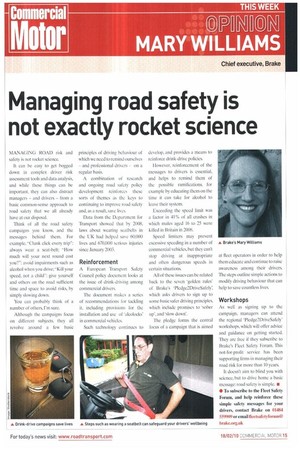Managing road safety is not exactly rocket science
Page 15

If you've noticed an error in this article please click here to report it so we can fix it.
MANAGING ROAD risk and safety is not rocket science.
It can be easy to get bogged down in complex driver risk assessment tools and data analysis, and while these things can be important. they can also distract managers and drivers from a basic common-sense approach to road safety that we all already have at our disposal.
Think of all the road safety campaigns you know, and the messages behind them. For example, "Clunk click every trip": always wear a seat-belt; -How much will your next round cost you?": avoid impairments such as alcohol when you drive; -Kill your speed, not a child": give yourself and others on the road sufficient time and space to avoid risks, by simply slowing down.
You can probably think of a number of others, I'm sure.
Although the campaigns focus on different subjects, they all revolve around a few basic principles of driving behaviour of which we need to remind ourselves and professional drivers on a regular basis.
A combination of research and ongoing road safety policy development reinforces these sorts of themes as the keys to continuing to improve road safety and, as a result, save lives.
Data from the Department for Transport showed that by 2008, laws about wearing seatbelts in the UK had helped save 60.000 lives and 670,000 serious injuries since January 2003.
Reinforcement A European Transport Safety Council policy document looks at the issue of drink-driving among commercial drivers.
The document makes a series of recommendations for tackling it, including provisions for the installation and use of 'alcolocks' in commercial vehicles.
Such technology continues to develop, and provides a means to reinforce drink-drive policies.
However, reinforcement of the messages to drivers is essential, and helps to remind them of the possible ramifications, for example by educating them on the time it can take for alcohol to leave their system.
Exceeding the speed limit was a factor in 41% of all crashes in which males aged 16 to 25 were killed in Britain in 2008.
Speed limiters may prevent excessive speeding in a number of commercial vehicles, but they can't. stop driving at inappropriate and often dangerous speeds in certain situations.
All of these issues can be related back to the seven 'golden rules' of Brake's 'Pledge2DriveSafely", which asks drivers to sign up to some basic safer driving principles, which include promises to 'sober up', and 'slow down'.
The pledge forms the central focus of a campaign that is aimed at fleet operators in order to help them educate and continue to raise awareness among their drivers. The steps outline simple actions to modify driving behaviour that can help to save countless lives.
Workshops As well as signing up to the campaign, managers can attend the regional 'Pledge2DriveSafely. workshops, which will offer advice and guidance on getting started. They are free if they subscribe to Brake's Fleet Safety Forum. This not-for-profit service has been supporting firms in managing their road risk for more than 10 years.
It doesn't aim to blind you with science, but to drive home a basic message: road safety is simple. • • To subscribe to the Fleet Safety Forum. and help reinforce these simple safety, mes,sages for your drivers, contact Brake on 01484 559909 or email Ileetsafetyforum@ brake.org.uk
































































































































